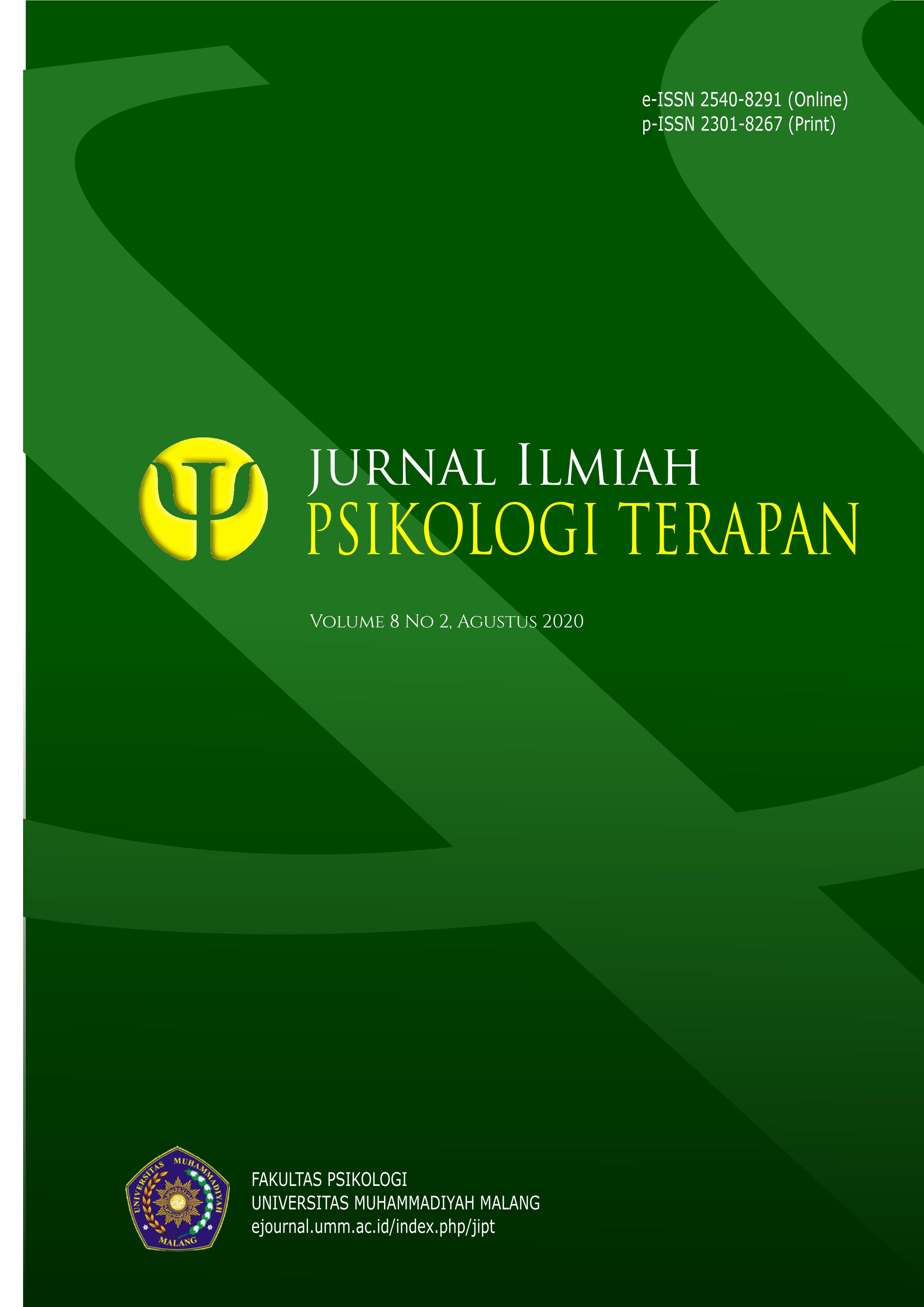Peran gaya pengasuhan dan penanganan secara religius terhadap resiliensi pada remaja dengan HIV/AIDS di DenpasarBali
DOI:
https://doi.org/10.22219/jipt.v8i2.10206Keywords:
Adolescence Living with HIV/AIDS, Parenting Style, Religious Coping, ResiliencyAbstract
Objektif:Tujuan dari penelitian ini adalah mengetahui peran parenting style dan religious coping secara bersama-sama maupun parsial terhadap resiliency pada remaja dengan HIV/AIDS di Denpasar-Bali. Penelitian ini menggunakan metode kuantitatif dengan 103 subjek remaja dengan HIV/AIDS di Denpasar-Bali
Metode: Penelitian menggunakan desain kuantitatif dengan 103 responden remaja penderita HIV/AIDS yang tinggal di DenpasarBali. Data penelitian diolah menggunakan multiple regression dan linear regression.
Temuan: Berdasarkan analisis yang dilakukan dalam penelitian ini, diketahui bahwa: parenting style Ayah dan religious coping bersama-sama berperan terhadap resiliency (ρ < .05, R2 = 0,384); parenting style Ibu dan religious coping bersama-sama memiliki peran terhadap resiliency (ρ < .05, R2 = 0,365).
Kesimpulan:Perhitungan secara parsial diperoleh hasil bahwa parenting style authoritative baik Ayah maupun Ibu, parenting style Ibu authoritarian, parenting style Ayah dan negative religious coping, parenting style Ibu dan positive religious coping, serta parenting style Ibu dan negative religious coping yang memiliki peran terhadap resiliency, sedangkan variabel lain tidak berperan terhadap resiliency.Downloads
References
Baumrind, D. (1971). Current Patterns of Parental Authority. Developmental Psychology Monograph, Volume 4. Bell, H., Jacobson, L., Zeligman, M., Fox, J., Hundley, G. (2017). The Role of Religious Coping and Resilience in Individuals with Dissociative Identity Disorder. Counseling and Values,Vol. 60. Benard, B. (2004). Resiliency What We Have Learned. San Francisco: WestEd. Betancourt, T., Ohki, S., Charroe, A., & Hansen, N. (2013). Annual Research Review: Mental Health and Resilience in HIV/AIDS-Affected Children – A Review of the Literature and recommendations for future research. Journal of Child and Psychology 54:4. Briere, J., & Jordan, C.E. (2004). Violence against women: Outcome complexity and implications for assessment and treatment. Journal of Interpersonal Violence, 19, 1252–1276. Buri, J.R. (1991). Parental Authority Questionnaire. Journal of Personality and Social Assessment, 57, 110-119. Cluver, L., Gardner, F., & Operario, D. (2007). Psychological distress amongst AIDS-orphaned children in urban South Africa. Journal of Child Psychology and Psychiatry, 48, 755– 763. Cluver, L.D., Orkin, M., Gardner, F., & Boyes, M.E. (2012). Persisting mental health problems among AIDS-orphaned children in South Africa. Journal of Child Psychology and Psychiatry, 53, 363–370. Compton, W. (2005). An Introduction to Positive Psychology. Wadsworth. Darmawanti, I. (2012). Hubungan antara Tingkat Religiusitas dengan Kemampuan dalam Mengatasi Stres (Coping Stress). Jurnal psikologi teori dan terapan. Edwina, O. (2012). Pengaruh Faktor Kepribadian (Trait), Proteksi, dan Risiko terhadap resilience pada Remaja usia 15-18 Tahun di Kotamadya Bandung. Bandung: Universitas Padjajaran Bandung. Kritzas, N., Grobler, A. (2005). The Relationship between Perceived Parenting Styles and Resilience during Adolescence. Journal of Child and Adolescence Mental Health, University of the Free State South Africa. Komisi Penanggulangan AIDS Provinsi Bali. 2014. Estimasi Popilasi Kunci dan Orang dengan HIV/AIDS (ODHA) Tahun 2014 di Kabupaten/Kota dan Provinsi Bali. Bali: Komisi Penanggulangan AIDS Provinsi Bali. Komisi Penanggulangan AIDS Provinsi Bali. 2018. Kumulatif Kasus HIV/AIDS Menurut Perkiraan Faktor Resiko dan Jenis Kelamin dari Tahun 1987-September 2018 di Provinsi Bali. Bali: Komisi Penanggulangan AIDS Provinsi Bali. McIntire, L., & Duncan, R. (2013). Associations among Religious Coping, Daily Hassles, and Resilience. Archieve for the Psychology of Religion 35. Santrock, J. (2017). Life-Span Development Sixteenth Edition. New York: McGraw-Hill Companies. Sari, W. (2016). Peran Koping Religius dan Dukungan Sosial terhadap Resiliensi pada Janda Usia Madya Pasca Kematian Pasangan Hidup. Universitas Gadjah Mada. Steinhardt, M., Dolbier, C. (2008). Evaluation of a Resilience Intervention to Enhance Coping Strategies and Protective Factors and Decrease Symptomatology. Journal of American College Health, Vol. 56. Suputra, D. (2018, July). Pengidap HIV/AIDS Terbanyak di Denpasar, 75 Persen Berusia 15-39 Tahun. Tribun Bali. Diunduh dari: http://bali.tribunnews.com/2018/07/02/pengidap-hivaids-terbanyak-di-denpasar-75-persen-berusia-15-39-tahun?page=1 Pargament, K., Raiya, H. (2007). A Decade of Research on The Psychologyof Religion and Coping: Things We Assumed and Lessons We Learned. Psyke & Logos. Pargament, K., Feuille, M., & Burdzy, D. (2011). The Brief RCOPE: Current Psychometric Status of a Short Measure of Religious Coping. Journal Religions. Permata, D., Listiyandini, R. (2015). Peranan Pola Asuh Orang Tua dalam Memprediksi Resiliensi Mahasiswa Tahum Pertama yang Merantau di Jakarta: Prosiding Pesat Universitas Gunadarma. Pratiwi, A., Hirmaningsih. (2016). Hubungan Coping dan Resiliensi pada Perempuan kepala Rumah Tangga Miskin. Jurnal Psikologi, Vol. 12 nomor 2. Utami, M. (2012). Religiusitas, Koping Religius, dan Kesejahteraan Subjektif. Jurnal Psikologi,Vol. 39 nomor 1. Yuri. (2016, May). Ayah dan Ibu Beda Cara dalam Hal Mengasuh Anak, Bagaimana Jalan Tengahnya?. Tabloid Bintang. Diunduh dari: https://www.aura.co.id/psikologi/read/38473/ayah-dan-ibu-beda-cara-dalam-hal-mengasuh-anak-bagaimana-jalan-tengahnya Zakeri, H, Jowkar, B, Razmjoee, M. (2010). Parenting Styles and Resiliency. Procedia Social and Behavioral Science 5.
Downloads
Published
How to Cite
Issue
Section
License
Authors who publish with Jurnal Ilmiah Psikologi Terapan agree to the following terms:
- For all articles published in Jurnal Ilmiah Psikologi Terapan, copyright is retained by the authors. Authors give permission to the publisher to announce the work with conditions. When the manuscript is accepted for publication, the authors agree to automatic transfer of the publishing right to the publisher.
- Authors retain copyright and grant the journal right of first publication with the work simultaneously licensed under a Creative Commons Attribution-ShareAlike 4.0 International License that allows others to share the work with an acknowledgment of the work's authorship and initial publication in this journal.
- Authors are able to enter into separate, additional contractual arrangements for the non-exclusive distribution of the journal's published version of the work (e.g., post it to an institutional repository or publish it in a book), with an acknowledgment of its initial publication in this journal.
- Authors are permitted and encouraged to post their work online (e.g., in institutional repositories or on their website) prior to and during the submission process, as it can lead to productive exchanges, as well as earlier and greater citation of published work (See The Effect of Open Access).

This work is licensed under a Creative Commons Attribution-ShareAlike 4.0 International License.











